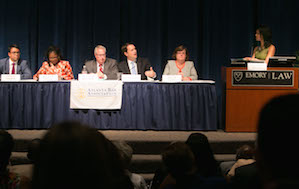Atlanta Bar presents historic voting rights conversation at Emory Law

Civil rights leaders reminisce about the early days of the Civil Rights Movement.
Nearly 58 years ago, a young attorney, Fred D. Gray, picked up 17-year-old John Robert Lewis from a bus station and took him to meet Rev. Martin Luther King, Jr. Monday night at Emory University School of Law, the old friends sat side-by-side again – this time in front of hundreds of legal minds – to discuss the state of voting rights in America. Their conversation was part of the Atlanta Bar Association’s event commemorating the 50th anniversary of the Voting Rights Act. Moderated by Monica Kaufman Pearson, the historic conversation was preceded by a panel discussion featuring five prominent attorneys who share an interest in voting rights cases, including Georgia’s attorney general, Sam Olens 83L.
The panel discussion focused on questions about the efficacy of the Voting Rights Act and the potential need for revision. Fredricka Whitfield, CNN News anchor, moderated the event, noting that the VRA was an answer to years of injustices and indignities. She started the discussion by asking panelists a series of thought-provoking questions, including: What was this law designed to do? How is it being used today? How has it changed? How should progress be measured? and What’s next?
Debo P. Adegbile, Barbara R. Arnwine, and former gubernatorial candidate Jason Carter argued that the VRA is still necessary, though it may require a new form to be most effective. Adegbile said the VRA is “a minority inclusion principle for people who were systematically excluded from our democracy.” He noted that there is still work to be done and that the remedy of the VRA should not last forever, but that we should not end the remedy until racism is ended. “We owe Lewis and Gray a great tribute” for what they did to help bring about the Voting Rights Act, he said. He added that the two narrowed the gap between the many “high promises” and “low practices” demonstrated in our country.
Olens and attorney Anne Lewis noted that Congress had failed to update the geographic coverage provisions of the VRA. Olens said, “Wherever racism is used to diminish minority voting, it is wrong.” He emphasized the need to address instances of racist voting practices on a national scale. “It’s not 1965,” Olens said, explaining that the systematic poll-blocking that occurred then is not happening in the same way or in the same places.
Hard-fought success and still so far to go.

Panelists discuss the efficacy of the Voting Rights Act and how changes to the document would affect the future of voting in America. Photo by Jessica McGowan.
While the panel discussion may have left some questions unanswered and generated a whole new cadre of questions for consideration, Congressman John Lewis 14H and Attorney Fred D. Gray left no question regarding the necessity of the VRA when it was enacted in 1965.
The pair told stories about the beginnings of the Civil Rights Movement, starting with a 1945 voting rights lawsuit filed in Tuskegee, Alabama. They provided insight into the days surrounding Bloody Sunday, Turnaround Tuesday and the eventual crossing of the Edmund Pettus Bridge and march to Montgomery. They talked like old friends who admire each other greatly. While suggesting we take up the old-school, grass-roots brand of activism, they commented on the current state of voting rights in America. Gray said, “There is a systematic effort in our country to make it harder and more difficult to participate in the political process. It should be easy and simple for people to participate, if we believe in our democracy.”
Lewis argued that requiring people to pay for documents that will allow them to get a required identification card is comparable to a poll tax. People who have been voting for 50 or 60 years without identification are being required to now produce it, he noted. When the discussion turned to people who do not bother to register and vote, Lewis added, “I tell people that if you don’t vote, you don’t count. There must be something very powerful about voting, or why would they have tried to keep it from us for so long?”
There is more to do for the cause of voting rights, both men suggested – and lawyers can be the ones to bring about the change. “Lawyers and the rule of law are what caused the Civil Rights Movement to exist,” Gray said.
“Under the rule of law, we have witnessed a non-violent revolution in this country. Our country is a better country because of lawyers.” He said that he was arrested more times than he could remember, to which Monica Pearson supplied the count: 40. “If it wasn’t for gifted lawyers, I don’t know what would have happened to me.” Turning to his old friend and attorney, Lewis said, “I want to thank you, Fred. Thank you for getting out there so early. For pushing and pulling. For helping to free and liberate all of us – all Americans. In the final analysis, we’re one people.”
Atlanta Bar Association president, Harold E. Franklin, Jr. 90C, presented a $1,000 gift from the Atlanta Bar Association to the Tuskegee Human and Civil Rights Multicultural Center in honor of Fred Gray. Franklin also presented $1,000 from the Atlanta Bar Association to Emory Law’s Dean and Asa Griggs Candler Professor of Law, Robert Schapiro, in support of the John Lewis Chair in Civil Rights & Social Justice.